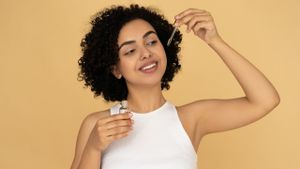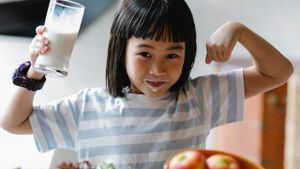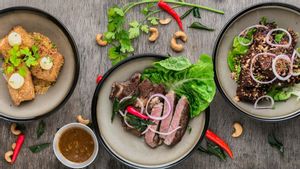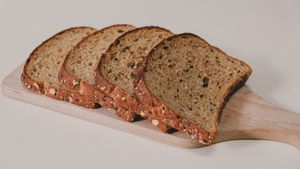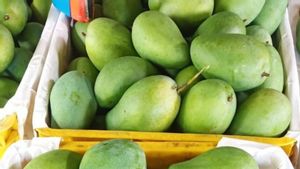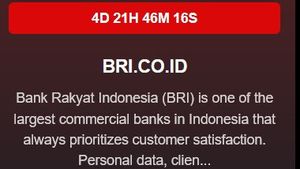JAKARTA - Medikopomology is the art of understanding and overcoming diseases and health problems through fruits. In short, medicopomology is a fruit that has medicinal-therapeutic properties.
As reported by Antara, Sunday, October 31, fruits have high nutritional value and are healthy for consumption, especially during the COVID-19 pandemic. Although now the pandemic era has changed to the new normal, consumption of fruits is still necessary, with the aim of maintaining health and body fitness.
Many people often serve a variety of fruits after a family meal, whether it be grapes, apples, avocados, cantaloupe, durian, dates, lemons, papayas, bananas, soursops, and tomatoes. These various fruits can be served as salads, juices, fruit ices, jelly fruit ices, fruit soups, pickled fruits, fruit cocktails, smoothies, to infused water.
These fruits have content as well as properties that are good for health. Actually, what are the contents and properties of these fruits? Let's study one by one.
Grapes (Vitis vinivera)
According to the USDA nutrient database, every 100 grams (3.5 oz) of purple/green grapes contains carbohydrates (18.1 grams), sugar (15.48 grams), dietary fiber (0.9 grams), fat (0.16 grams). ), protein (0.72 grams), vitamins B1 (0.069 mg), B2 (0.07 mg), B3 (0.188 mg), B5 (0.05 mg), B6 (0.086 mg), B9 (2 ug) , C (10.8 mg), E (0.19 mg), K (22 ug), phosphorus (20 mg), potassium (191 mg), calcium (10 mg), magnesium (7 mg), manganese (0.071 mg), sodium (3.02 mg), zinc (0.07 mg), iron (0.36 mg).
Grape seeds contain flavonoids (4-5 percent), quercetin, and myricetin. Flavonoids are phytochemical compounds that give grapes their purple color.
Apart from being delicious, grapes are also efficacious as chemopreventive (preventing infectious diseases), have the potential to cure liver cancer (hepatocarcinoma), overcome anemia, diabetes mellitus, hyperglycemia, colorectal malignancies (colon and anus), leprosy, and jaundice (yellowness).
Apple (Malus domestica)
Apples are found in more than 20 countries in the world, including Indonesia. Green apples are rich in vitamin A, vitamin C, polyphenols, magnesium, phosphorus, calcium. In general, apples contain potassium, iron, zinc, antioxidants, phytochemicals, fiber, tannins, boron, flavonoids, quercetin, tartaric acid.
Epidemiological studies have proven that apples are effective in reducing the risk of certain cancers, cardiovascular disease, obesity, lung dysfunction, asthma, and diabetes.
Avocado (Persea Americana Mill)
This plant native to Central America is efficacious to overcome health problems, such as menorrhagia (abnormal bleeding during menstruation), hypertension, abdominal pain, bronchitis, diarrhea, diabetes. Avocado contains peptone, b-galactoside, glycosylated abscisic acid, alkaloids, cellulose, polygalactourease, polyuronoid, cytochrome P-450, and volatile oils.
Cantaloupe (Cucumis melo var. Cantalupensis L)
Cantaloupe contains water (> 90%), fiber (0.9 g/100 g), provitamin A or beta carotene (2029 mg/100 g), vitamin C (36.7 mg/100 g), potassium (267 mg/100 g). 100 grams), flavonoids, polyphenols, malonic acid, saponins.
Cantaloupe is efficacious in increasing the body's immunity, lowering blood pressure, strengthening kidney and spleen function. According to research, consuming 50 mg of beta carotene per day reduces the risk of suffering from heart disease.
SEE ALSO:
Durian (Durio zibethinus)
Durian fruit is known to the people of Indonesia since more than 1300 years ago. Durian contains carbohydrates (27.9 grams), fat (3.4 grams), protein (2.6 grams), calories (153), minerals (103.9 grams), beta-carotene (140 mg), vitamin B1 ( 0.1 mg), vitamin B2 (0.13 mg), vitamin C (23.2 mg) per 100 grams of edible durian.
Durian has cytotoxic substances, conquering cell lines of various cancers, such as: maslinic acid, phenolic constituents eucryphin, lignans, scopoletin (conquering leukemia cells). Flesh efficacious antiworm, aphrodisiac, bacteriostatic. The herb leaves and durian fruit are efficacious to deflate swelling and recovery of skin diseases.
Dates (Phoenix dactylifera L)
Dates have more than 2,500 species. Dates are rich in carbohydrates, fiber, protein, B complex vitamins, namely thiamine (B1), riboflavin (B2), niacin (B3), pantothenic (B5), pyridoxine (B6), folate (B9), minerals such as calcium, iron, magnesium, selenium, copper, phosphorus, potassium, zinc, sulfur, cobalt, fluorine, manganese, boron, and phytochemical substances in the form of carotenoids, polyphenols (phenolic acids, isoflavones, lignans, flavonoids), tannins, sterols.
Dates are efficacious as antioxidants, anticholesterol, anticancer, antidiabetic, and prevention of cardiovascular disease.
Lemon (Citrus limon L)
Lemon contains 28 calories/100 grams, water (90%), protein (0.8 grams), fat (0.5 grams), carbohydrates (8.2 grams), fiber (0.6 grams), ash (5, 4 grams), minerals, in the form of calcium (33 mg), phosphorus (15 mg), iron (0.5 mg), sodium (3 mg), potassium (137 mg), vitamin A (12 mg), vitamin B1 ( 0.5 mg), vitamin B2 (0.02 mg), and niacin (0.1 mg).
Then vitamin C (52 mg), flavonoids (flavanones, flavone glycosides, flavonols, flavone aglycones, polymethoxyflavones), phenolic compounds (hydroxycinnamic acid, and hydroxybenzoic acid).
The main components of flavanones and major flavones are eriocitrin, hesperidin, diosmetin 7-O-rutinoside (diosmin), C-glycosides of diosmetin and apigenin. Lemon is efficacious as aromatherapy, antiscorbut, antibacterial, astringent (skin tightening), carminative (preventing excessive gas production in the stomach), stimulant.
Papaya (Carica papaya L)
Papaya is a fruit that knows no seasons, rich in beta-carotene, fiber, folate, antioxidants, namely vitamin A, vitamin C, and vitamin E. Papaya also contains B vitamins, minerals, such as: magnesium, potassium, digestive enzymes (papain).
Papaya is efficacious as an antioxidant, anticancer, protectors from cardiovascular disease, prevention of heart attacks, diabetic heart disease, stroke, and colon cancer (large intestine).
Banana (Musa paradisiaca L)
Bananas contain carbohydrates, fats, B vitamins, vitamin C, mineral salts, catecholamines (norepinephrine, serotonin, dopamine), tryptophan, indole compounds, pectin, flavonoids, triterpenes, tannins, non-crystalline sugars, albominoids, and iron.
Banana fruit and various parts of the tree have traditionally been used in various countries for the treatment of diabetes, diarrhea, dysentery, eczema, menstrual disorders, snake bites, gout, hemoptysis (coughing up blood), inflammation (inflammation), cholera, intestinal lesions in ulcerative colitis ( intestinal ulcers), blisters and burns, nephritis (kidney infection), uremia (a complication of kidney failure), and heart disease.
Soursop (Annona muricata L)
Soursop contains about 212 bioactive compounds, dominated by acetogenin (annonacin), alkaloids (reticuline, coreximine, isoquinoline, aporphine, protoberberine), phenols (quercetin, gallic acid), and other compounds (vitamins, carotenoids, amid, cyclopeptides, megastigman).
Soursop has traditionally been used in various countries to treat allergies, asthma, bronchitis, anxiety, typhoid fever, dermatitis, diabetes, diarrhea, dysentery, flu, kidney disorders, snake bites, hypertension, vaginal infections, inflammation (inflammation), insomnia (disorders). sleep), cancer, leprosy, malaria, neuralgia, back-abdominal pain, skin-kidney disease, rheumatism.
Tomato (Solanum lycopersicum L)
According to FAO (2014), global tomato production reaches 170 million tons per year. Tomatoes are found in more than 150 countries. Tomatoes contain vitamin C, potassium, folic acid, carotenoids (in the form of lycopene), neoxanthin, lutein, alpha-cryptoxanthin, alpha-carotene, beta-carotene, cyclolycopene, and beta-carotene 5,6-epoxide.
Tomatoes and their derivatives are efficacious as antiobesity, antihyperglycemic, antihypercholesterolemic, anticancer, and dietary supplements.
With the myriad benefits of the fruits above, of course, all of them are very healthy to consume in order to maintain body resistance and avoid disease, especially in the midst of the COVID-19 pandemic.
The English, Chinese, Japanese, Arabic, and French versions are automatically generated by the AI. So there may still be inaccuracies in translating, please always see Indonesian as our main language. (system supported by DigitalSiber.id)



